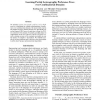Free Online Productivity Tools
i2Speak
i2Symbol
i2OCR
iTex2Img
iWeb2Print
iWeb2Shot
i2Type
iPdf2Split
iPdf2Merge
i2Bopomofo
i2Arabic
i2Style
i2Image
i2PDF
iLatex2Rtf
Sci2ools
AAAI
2015
2015
Learning Partial Lexicographic Preference Trees over Combinatorial Domains
We introduce partial lexicographic preference trees (PLPtrees) as a formalism for compact representations of preferences over combinatorial domains. Our main results concern the problem of passive learning of PLP-trees. Specifically, for several classes of PLP-trees, we study how to learn (i) a PLPtree consistent with a dataset of examples, possibly subject to requirements on the size of the tree, and (ii) a PLP-tree correctly ordering as many of the examples as possible in case the dataset of examples is inconsistent. We establish complexity of these problems and, in all cases where the problem is in the class P, propose polynomial time algorithms.
| Added | 27 Mar 2016 |
| Updated | 27 Mar 2016 |
| Type | Journal |
| Year | 2015 |
| Where | AAAI |
| Authors | Xudong Liu, Miroslaw Truszczynski |
Comments (0)

